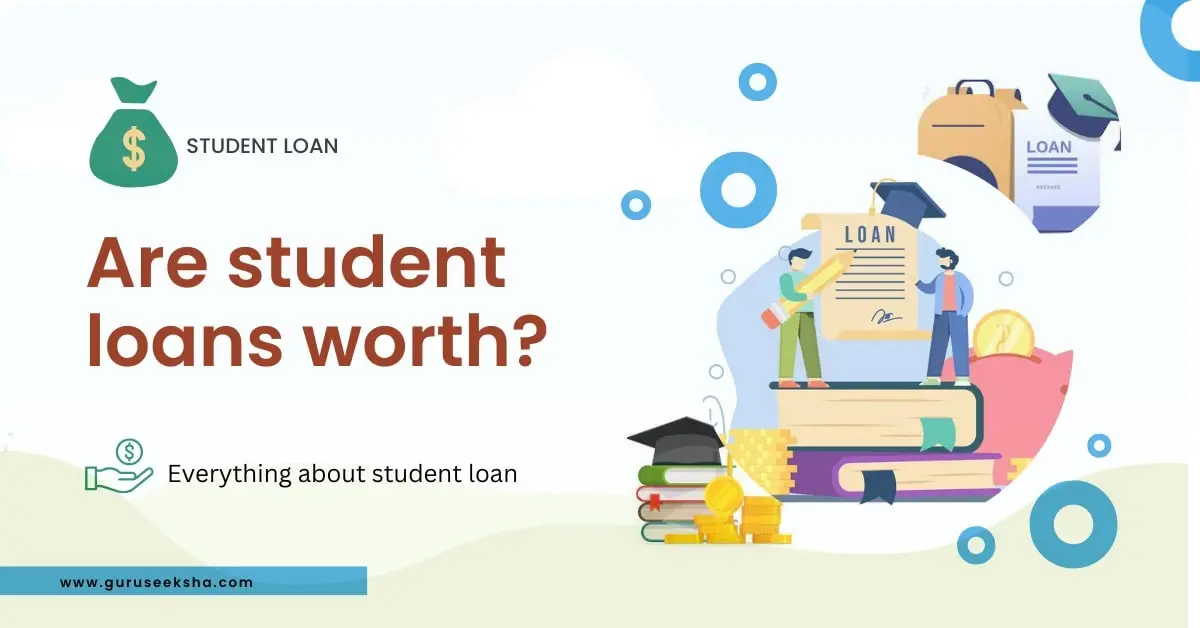With an average starting salary of around $52,000, many wonder if their investment will pay off. Are student loans worth it? Unfortunately, there is no straightforward answer to this.
Every year, college graduates hope to make the leap from being a student to being working adults. Among them, two-thirds of students graduate with student loans, with an average balance of $29,990. From developed countries to developing countries taking students loan has been a popular trend.
Student loans can be a burden, especially in the early stages of your career if you don’t take the right steps toward it.Here’s how to know if student loans are worth it for you and your family.
What is a student loan?
Student loans are lump-sum payments from federal, state, or private companies that can be used to pay for tuition and other school expenses. However, this money and interest must be returned after graduation.
In addition to scholarships, grants, and apprenticeship programs, many learners use student loans to finance their education. Student loans are a useful tool if used responsibly.
‘Student Loan Hero’ reports that 69% of students in the 2019 class took out loans to cover college expenses. It’s best to borrow as little as possible to minimize long-term costs. Before you take out a large loan, research starting salaries in your field to see if you can afford to pay it off after graduation.
Are student loans worth it? Let’s understand their advantages and disadvantages first.
Advantages of student loan
- Student loans provide financial assistance to students who are otherwise unable to attend college.
- You don’t need a credit history to get a student loan.
- Student loans often have lower interest rates than personal loans.
- Fixed interest rates prevent loan terms from changing over time.
- Many student loans don’t require repayment until after graduation, and you may have additional options to defer or forgive the loan if needed.
- Student loans often offer flexible repayment schedules that are tailored to the borrower’s income and cost of living.
Disadvantages of student loan
- There is a limit to the state subsidies that individuals can receive.
- If you drop out of college without a degree, you will have to pay off your loan quickly.
- Private student loans may require a joint guarantor.
- Student loans can be expensive, depending on how much you owe and the interest rate.
- A student loan default can lead to a deterioration in creditworthiness.
- There is great fluctuation in the interest rates on the private student.
- Depending on financial need, students may not be eligible for some loans.
Questions to ask yourself before taking students loan
The following questions will shed some light on are student loans worth it or not.
What’s my salary for my preferred major?
Remember!!!! Not all majors have the same income potential. It can take time to decide on a future career at the age of 18. Students can choose schools based on specific programs, but 30% change majors within three years, according to the Ministry of Education.
Changing majors may not seem like a big deal, but your studies can have a direct impact on your future earnings.
According to her 2019 study by the National Association of Colleges and Employers (NACE), students with STEM degrees can expect the highest average starting salaries. Here are the average starting salaries that students can expect in various majors:
- Technology – $69,188
- Informatics – $67,539
- Mathematics and Science – $62,177
- Business – $57,657
- Social Science – $57,310
- Humanities – $56,651
- Agriculture and Natural Resources – $55,750
- Communications – $55,750
Student loans are a big decision you’ll have to deal with for years after college. Before you apply for a large student loan, it’s a good idea to research the income potential of the major you have selected.
In high-demand, high-income fields, it may be easier to justify higher student loan balances. However, you may want to limit your spending on measures with low revenue potential.
How much should I borrow?
The amount you borrow depends on your needs. If you have scholarships or grants, you don’t need to get as much as if you didn’t have free money. If you do not receive a scholarship or grant, you will need to borrow enough money to cover your out-of-pocket costs.
To avoid borrowing a lot of money and then paying it back, see if you qualify for need-based assistance from FAFSA and apply for private grants. Also, see if your family is saving money for a college education. The less you need to cover your student loan, the less interest you will have to pay.
How I am going to repay the loan?
Before you take out a student loan, think about your future repayment plan. Federal student loans and many private student loans begin repayment six months after you graduate or qualify for midterm enrollment.
This is helpful if you can’t get a job in your field right out of college, or if you’re taking time to come up with regular payments.
If you have federal student loans, follow a standard repayment schedule, consolidate multiple loans into one, try an income-based repayment plan, or apply for government loan forgiveness depending on your career path can.
Once you’ve exhausted all your federal student loan options, it’s a good idea to check private student loan rates.
These types of loans don’t have the same repayment options, but you can find a repayment term that better suits your budget. You may be eligible for loan refinancing if you need to adjust your repayment schedule.
Additional factors to consider before getting a loan
Whether it’s wise to take a student loan depends on many factors, including where you go to school, how much you need to borrow, and how you can repay the loan. Consider the following considerations:
Loans are not free:
It’s easy to think of spending money now and not giving it back in years. But even if you don’t have to repay the loan in full after closing, the loan is still a monthly financial obligation. And the longer it takes to pay off, the more interest you have to pay.
Repayment is not quick:
The standard federal student loan amortization schedule is 10 years and the income-based amortization schedule is 20 or 25 years. Even if your monthly payments can be managed based on your income, it takes a long time to pay for a school you’ve only been to for a few years.
Your college matters:
Some schools have prestige and weight, but that usually means higher prices. Universities with high tuition fees are not necessarily the best. Save money on college by attending a community college or taking online courses.
You are not guaranteed anything: Whether it’s a degree or a well-paid job, nothing is guaranteed about your future. In other words, if you take out a 6-figure loan, you will have to pay it back, regardless of whether you have a 6-figure income.
Loans aren’t the only option: You don’t need a student loan to pay your tuition. First, take advantage of all the free resources, including scholarships, grants, and special college savings. It’s also wise to take out federal student loans before transitioning to private student loans.
Getting the conclusion
So, are student loans worth it? It’s up to you. For some students, a college degree is invaluable and can pave the way to financial security. In certain situations, student loans can serve as a useful tool to help you reach your goals.
However, be careful when borrowing money. Student loans can be expensive and can take decades to pay off. Especially if you are heavily indebted but work in a low-wage sector.
Reduce your education costs by applying for as many grants and scholarships as possible. Grants and scholarships don’t have to be repaid, so you can save money and avoid reapplying for student loans.
Final words,
If you decide to go to college or pursue post-secondary education, it is recommended to strive for the degree or certification you started with, if possible.
If you’re paying off those loans using the money you’ve already borrowed, dropping off your college can be very expensive.
Without a degree, you miss out on the financial benefits of a degree and fall into the trap of student loan debt. Investing in college is important, but planning ahead will give you the best return on your money and all your hard work.
For me personally, if are studying a decent enough major and you are quite sure that you can complete that then certainly student loans are worth it and they are a good investment for sure.
Student loans in Nepal are also increasing nowadays, especially for foreign studies. Yet the decision is on your hands whether you want to take a student loan or not.
.



